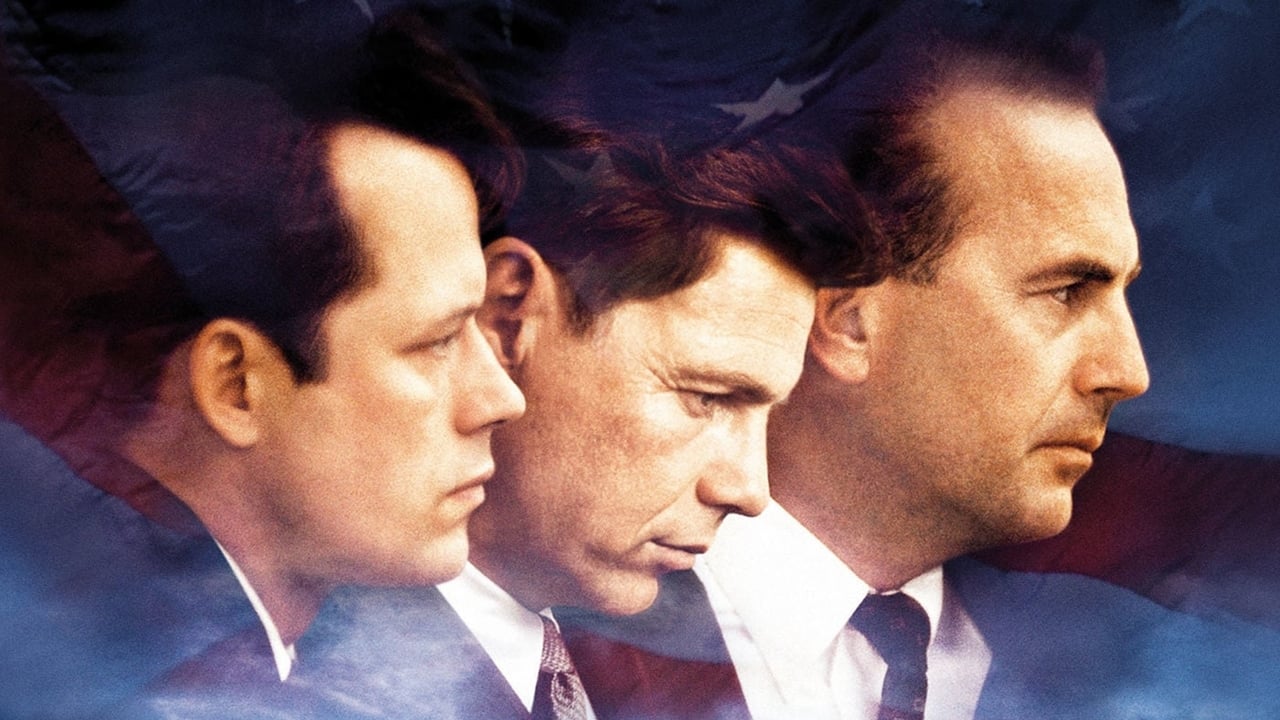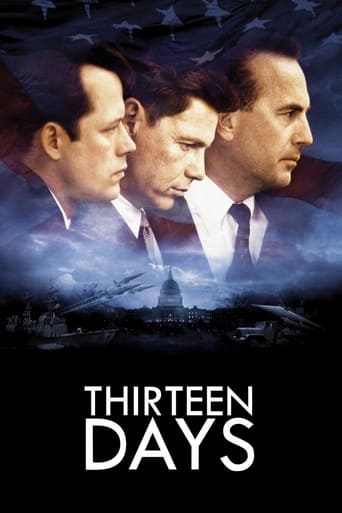Manthast
Absolutely amazing
Grimossfer
Clever and entertaining enough to recommend even to members of the 1%
Sameer Callahan
It really made me laugh, but for some moments I was tearing up because I could relate so much.
Tyreece Hulme
One of the best movies of the year! Incredible from the beginning to the end.
dglink
In October 1962, the United States and the Soviet Union were on the verge of war over Soviet missile installations in Cuba. Based on President John F. Kennedy's tapes and a script by David Self, Roger Donaldson's outstanding film, "Thirteen Days," effectively recreates that tense Cold War period. Told from the perspective of JFK's White House, including the president; his brother Robert, the Attorney General; and the Special Assistant to the President, Kenny O'Donnell; the film is largely dialog driven. Evidently based on actual conversations, cabinet meetings, and confrontations between the administration and the military, the proceedings have the ring of truth. Kevin Costner, who also co-produced, heads the cast as O'Donnell; his effective low-key performance communicates the stress of his unique job situation and the toll it takes on his family and private life. In one particularly effective scene, Costner stands outside a church, where a line of parishioners are waiting for confession; a sign says that confession is available throughout the night, and, after a pause, Costner joins the line.Bruce Greenwood and Steven Culp play John and Robert Kennedy, respectively; both actors bear a passing resemblance to the Kennedy brothers, and, with Boston accents, they quickly submerge themselves into their parts, and the leads are well supported by a cast of pros, who portray a who's who of Kennedy administration officials familiar to any Baby Boomer who lived through the Camelot era; among them, Dylan Baker as Robert McNamara, Michael Fairman as Adlai Stevenson, and Len Cariou as Dean Acheson are worth mentioning.Although the film's ending is already part of history, "Thirteen Days" remains engrossing, often tense, suspenseful, and fast paced. An excellent score by Trevor Jones punctuates the action, and the footage shifts from color to black and white in a seemingly arbitrary manner; however, whatever the intention, the shifts neither add nor detract from the movie. Stock footage depicts civil defense preparations, and shots of nuclear explosions foretell what could occur if the negotiations between the U.S. and the Soviets had failed. Donaldson avoids claustrophobia by cutting from the White House to action in the skies over Cuba and events at sea as the U.S. blockade of Cuba takes effect. An excellent film that is well made and well performed, "Thirteen Days" is more than a history lesson; it is a warning as well. The film would make a good double bill with Costner's earlier Kennedy movie, "JFK."
classicsoncall
If you lived through the era, you knew things were tense. Average people were getting ready, preparing to meet their Maker. If anything, the film paints an even grimmer picture than anyone outside of the Kennedy Administration inner circle could have contemplated, with the entire world a stone's throw away from the brink of nuclear war.It seemed to me that the events as depicted in the story were fairly accurate historically. What particularly impressed me the first time I saw this movie, which was reinforced again when I watched it the other night, was how forceful John F. Kennedy (Bruce Greenwood) was in facing down his generals to avoid a military confrontation right from the outset. The same with Robert McNamara (Dylan Baker) as Secretary of Defense in his row with the Admiral who ordered the 'star missiles' to be fired as a warning.However of all the names mentioned in the story who were part of Kennedy's cabinet, along with the principal military leaders of the time, the one name that didn't offer a hint of recognition was that of Ken O'Donnell (Kevin Costner), who in this picture was accorded as much significance as that of JFK and brother Bobby (Steven Culp). I chalk that up to Costner being one of the movie's producers, and if I'm all wrong about that, so be it. I thought the character had an important presence in the story, but have to wonder if the real Ken O'Donnell would have had as much influence with the brothers Kennedy.Considering the real world paranoia that gripped the world during this thirteen day span of time during October, 1962, an interesting contrast can be made against the fictional story presented in 1964's "Fail-Safe", about an accidental launching of an American nuclear missile strike against Russia with no hope of retrieval. Filmed just a couple short years following the Cuban Missile Crisis, the story is a real nail biter with an unbelievable resolution intended to 'even out the destruction' between military super powers. If you haven't seen it, check it out.One note of irony in this film's casting, that of Stephanie Romanov as Jackie Kennedy. Although her mother was American born, her father was of Slovakian descent, with a last name that most anyone would mistake for Russian. I wonder if anyone connected with casting on the picture thought about that.
Anup Viswanathan Thampi
The years between 1960-70 holds great importance to the US. Most of the revolutions and changes that were yet to come happened during this time period. Assassinations of Leaders like Martin Luther King, Malcolm X, John F Kennedy,JFK and RFK. I am an Indian(Asia) have seen several movies that deals or just scrapes with the JFK issue but none of the movies showed how good this man was or his brother. Bobby(movie) even though everyone says he is a fine man but no reels on the reality. This movie also shows how JFK & RFK wanted peace more than anything and how some of the generals or high officials disliked their NEED FOR PEACE as WEAKNESS. I say it takes a lot of courage to stand up to what you believe and fight for peace rather than go into war and ruin others life when the main guys who initiated this remains hidden in a thick fortress of shield. It takes a lot of courage and good soul to think about the farewell of millions of countrymen over power and show offs of STRENGTH. I think we need more of these of men than those who think peace is for weaker. JFK held the position in the most controversial and difficult times for USA. All the actors did a marvelous job and I personally think Kevin is a guy who cherishes and loves JFK and Bobby. As he did JFK related movies. All in all politics is shown at its best.
billk51
Now that we are removed almost 50 years from this event, can we at last give the straightforward account of the Cuban Missle Crisis.In 1961 the United States moved one hundred Intermediate Range Ballastic Missiles onto the territory of its allies Turkey and Italy. These missiles could strike Moscow with nuclear warheads on very short notice.The Soviet Union, not being pleased by this, countered by moving intermediate range ballistic missiles into its ally Cuba, where they could strike Washington on short notice.The United States showed outrage at this provocative policy without drawing the obvious comparison with the US missiles in Turkey and Italy, except to getting around to saying that the missiles were obsolete anyway one year after being deployed. The US threatened to attack the missiles in Cuba and then invade.This supposedly would move us to the brink of mutual nuclear annihilation. But given the reasonable sanity of our government (except for Gen. Curtis Lemay, the mass murderer of millions of Japanese women and children in WWII), would this have actually happened? Someone would have pulled back from the brink at the cost of looking weak. This someone turned out to be the "stupid peasant" leader of the USSR Nikita Khrushchev, who arranged a back door deal to break the deadlock.What the deal came down to really required brilliance: the Russians would remove the missiles from Cuba and the US would remove the missiles from Turkey (which were obsolete, you recall). But the removal of the Turkish missiles was not to be made public. Instead it would be said that the missiles were being removed because the US promised never to invade Cuba. As if a diplomatic promise between two enemies was ever good for anything.So the hero turns out to be stupid Khrushchev, who appeared to be making the bargain of a weak fool, but did not let that stop him from preventing the destruction of the world.

